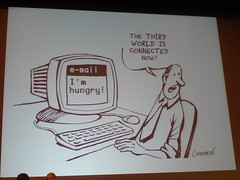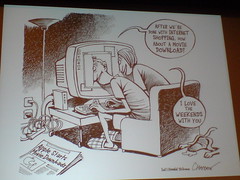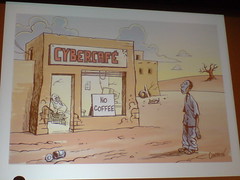LIFT07: The New Economics of Creation, Panel
LIFT07: The New Economics of Creation, Panel
 Moderated by Philippe Mottaz, director, AnyScreen
Moderated by Philippe Mottaz, director, AnyScreen
L to R:
John Buckman: Founder, Magnatune and BookMooch, Creative Commons Board Member
Rodrigo Sepulveda Schulz: CEO, vpod.tv
Zhang Ga: Artistic Director / Curator, China International New Media Arts Exhibition 2008
Patrick Chappatte: Cartoonist
PM: How do we finance arts and culture in a world where "free" is a guiding light?
PC: As a cartoonist, I'm closer to a journalist than an artist. Technology makes the world smaller. The internet was supposed to solve all the worlds problems (was it?).
PC shows off a whole load of excellent cartoons :)
JB: I run a music web site called Magnatune (strapline: "we are not evil"). How do you make money for musicians in a world where music can be obtained for free? The music business is seen as an evil corrupting force, because it behaves like one. There's limited diversity in stores (look at the decline of classical). Using file sharing is "just acting like a just-cause revolutionary". If the music industry dies it'll take a lot of culture down with it. Magnatune sells downloads and CDs using a Creative Commons license so non-commercial use can be made for free. We sell music we have selected (about 600 albums). Customers pay what they want, 50% goes to the musician. On average folks play $8.70 (more than the minimum $5). Everywhere throughout the site are closeups of musicians faces looking at you, to help build a connection with them. The Body Shops "no animal testing" is really saying "if you buy Chanel, you're hurting bunny rabbits". They also license to film makers etc. (except porn or politics). Podcasting is illegal with commercial music, we allow podcasters to use our music through a special license. Music reviewers can get music for free too. They ask purchasers to give their album to 3 friends: "because we know you've discovered great music through your friends". JB puts his face all over the web site too, to keep things personal.
 RSS: I'm co-founder at vpod.tv, we enable everyone to create their own TV channel. 2006 saw an explosion in online video companies. Time shifting, device shifting, place shifting. How do you retain customers here? Is YouTube what Internet video should be? Shows the Venice Project/Joost. Bubblegum and vpod.tv are doing similar things. 20 people, simplify the creation of TV channels, connecting any video source to any screen in a few clicks. Cut off by moderator - this was interesting looking, but a sales presentation.
RSS: I'm co-founder at vpod.tv, we enable everyone to create their own TV channel. 2006 saw an explosion in online video companies. Time shifting, device shifting, place shifting. How do you retain customers here? Is YouTube what Internet video should be? Shows the Venice Project/Joost. Bubblegum and vpod.tv are doing similar things. 20 people, simplify the creation of TV channels, connecting any video source to any screen in a few clicks. Cut off by moderator - this was interesting looking, but a sales presentation.
ZG: My business is not money-making. I'm a curator from NY, working on a project for National Art Museum of China. There are v few institutions dedicated to production and discussion of new media arts, IDEM (?). I deal with artists, they don't make money: they have part-time jobs, they get funding from foundations, get occasional commissions. There's no market in the art world for media-based art (specifically new media). There's hardly any state funding for art in the US, the market is driven by money so it's a business.
PM: I'm doubtful about this. Rodrigo, the value proposition of Magnatune is clear. Why would I give my video to ipod.tv, if I have talent or know-how? How do you have a sustainable model if you're not paying?
RSS: We do revenue share, 50/50 with the content creator. It's a collective fantasy that everyone will make money out of this. Advertising audiences are counted by the 1000 - ad units go for 10-20 Euros. The media are saying to everyone that they'll make money out of this, but that's not true.
PC: I never had to make money from the web, so it was a luxury for me. I'm paid by newspapers. Before, I was with a syndicator in New York who had a thousand cartoonists. I quit the syndicator in 1995 to start my own web site (globecartoon.com), which let me syndicate my own cartoons. The syndicators aren't agents, they just syndicate content.
PM: Can we agree on the notion of fair culture?
JB: With the internet, aggregators and distributors have less power. Now there are deals where the artist keeps copyright and makes 20%, say.
 Audience: I'm a photographer and I use Flickr. Flickr got me commissions thanks to photos I put up via Creative Commons, so it works as advertising. The network of people who see my images acts to control copyright infringement. e.g. someone saw a photo of mine being used by Amex in the US and alerted me.
Audience: I'm a photographer and I use Flickr. Flickr got me commissions thanks to photos I put up via Creative Commons, so it works as advertising. The network of people who see my images acts to control copyright infringement. e.g. someone saw a photo of mine being used by Amex in the US and alerted me.
JB: The language we use in our licenses is "you may not use this media for commercial gain". In the states, the enforcement rule of thumb is 3 x license fee + legal fees
I lost interest here and got distracted by interesting discussions in the IRC backchannel...
JB: 2 years ago big media was suing any new radical companies in the market. Now they're working with YouTube instead of trying to destroy it. The ecology to support creative people is emerging. The online magazine Slate went profitable this year.
PC: The average user who copies a cartoon and puts in on his website isn't making money. I just expect them to link back to the author, that's all I ask for.
ZG: The attention economy does not necessarily generate revenue. Successful artists aren't necessarily rich.